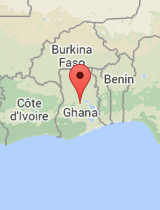Medical Summary
The health risk information presented here is summarized from Shoreland Travax®, a decision-support tool used by health care providers to perform a detailed health risk analysis based on specific locations, individual travel styles, and traveler risk behaviors. Travax provides practitioners current, independently researched malaria risk and prevention recommendations in a map-based format that goes beyond the annual WHO and US CDC statements included here. Not included here are current reports from Travax of disease outbreaks or environmental events that may pose elevated risks to travelers’ health and safety. The Providers section of this site offers a directory of health care providers who utilize Shoreland Travax for travel health counseling. Learn more about the detailed reports and maps available from these practitioners (includes links to samples).
General Information
Ghana is a developing nation classified as lower middle income. Located in western Africa along the Gulf of Guinea (east of Côte d'Ivoire and west of Togo), the climate classifications range from humid equatorial (long dry season) in the south to dry (semi arid) in the north.
Vaccinations
Routine vaccinations are essential due to a persistent global rise of vaccine-preventable diseases (especially markedly high rates of diphtheria, pertussis, and measles). Prior to travel, travelers should be up-to-date with the age-appropriate and risk-based routine vaccinations recommended by their home country, which may include:
- COVID-19
- H. influenzae type B (Hib)
- Hepatitis A
- Hepatitis B: Protection is especially important for those at increased risk.
- Herpes zoster
- Human papillomavirus
- Influenza
- Measles, mumps, rubella: A single early dose is recommended for travelers aged 6-11 months.
- Meningococcal
- Pneumococcal
- Polio
- Rotavirus
- Tetanus, diphtheria, pertussis: Tdap preferred; consider an early pertussis booster for high-risk travelers.
- Varicella
Yellow Fever
See also: Library article for Yellow Fever
- Requirement: A certificate proving yellow fever vaccination is required for all travelers aged ≥ 9 months.
- Official Status: listed by WHO as a country where YF transmission risk is present.
Other Vaccines
Depending on your itinerary, your personal risk factors, and the length of your visit, your health care provider may offer you vaccination against chikungunya, cholera, dengue, mpox, rabies, or typhoid fever.
Malaria
See also: Library article for Malaria
The following is current information as reported by the World Health Organization (WHO) and the US Centers for Disease Control (CDC):
WHO—International Travel and Health (current online update, Country List)
(2019) Malaria risk due predominantly to P. falciparum exists throughout the year in the entire country.- Recommended prevention: C – Risk of P. falciparum malaria. Mosquito-bite prevention plus atovaquone-proguanil or doxycycline or mefloquine chemoprophylaxis (select according to drug-resistance pattern, reported side-effects and contraindications).a, b
aAlternatively, for travel to rural areas with low risk of malaria infection, mosquito bite prevention can be combined with stand–by emergency treatment (SBET).
bIn certain areas with multidrug-resistant malaria, mefloquine chemoprophylaxis is no longer recommended. At present, these areas include Cambodia, south-eastern Myanmar and Thailand.
WHO Country List footnote: When available, the date of the most recent update or confirmation is indicated in parentheses in the country list. If no accurate date is indicated, the most recent update or confirmation was provided prior to 2013.
CDC—Health Information for International Travel (current online edition)
Transmission areas
- All
Drug resistance1
- Chloroquine
Species
- P. falciparum (primarily)
- P. malariae, P. ovale, and P. vivax (less commonly)
Recommended chemoprophylaxis
- Atovaquone-proguanil, doxycycline, mefloquine, tafenoquine2
1 Refers to P. falciparum malaria, unless otherwise noted.
2 Tafenoquine can cause potentially life-threatening hemolysis in people with glucose-6-phosphate-dehydrogenase (G6PD) deficiency. Test for G6PD deficiency with a quantitative laboratory test before prescribing tafenoquine to patients.
Other Concerns
Travelers' Diarrhea
See also: Library article for Travelers' Diarrhea
High risk exists throughout the country, including in deluxe accommodations. Community sanitation and food safety measures are generally inadequate. Some itineraries (e.g., remote destinations, austere accommodations) and activities (e.g., ecotourism, eating street or local-market food) further increase risk.
Travelers should observe food and beverage precautions, which reduce the likelihood of illness.
Travelers should carry loperamide for self-treatment of diarrhea and, if risk is moderate to high, an antibiotic to add if diarrhea is severe. Consult a knowledgeable health care provider regarding which antibiotic is appropriate for you and most effective for your destination.
Other Food-Borne Illnesses
Precautions to prevent brucellosis may be needed.
Insect- and Arthropod-Borne Diseases
Leishmaniasis, onchocerciasis, West Nile virus, Zika may pose a risk. Personal protective measures are important.
Other Disease and Health Risks
Additional concerns include air pollution, anthrax disease, avian influenza, Crimean-Congo hemorrhagic fever, helminths, hepatitis C, lassa fever, leptospirosis, marine hazards, melioidosis, schistosomiasis, sexually transmitted infections, snakebites, tuberculosis.
Safety and Security
See also: Library article for Safety and Security
Key Safety Risks
- Road conditions and traffic collisions
- Public transportation
- Domestic and/or international air travel
- Petty crime
- Heightened crime risk for women
- Heightened crime risk for LGBTQ+ travelers
- Scams
- Natural disasters
Key Security Threats
- Risk of terrorist attacks by transnational groups
- Risk of violent civil unrest
- Cross-border threats in areas bordering Burkina Faso, Côte d’Ivoire, Togo
- Violent crime
- Kidnapping, which may target foreign nationals
- Piracy
Emergency Contacts
The police emergency number is 191.

